高考英语动词归类复习总结
高中英语语法分类总结--动词及动词短语

pay
attentionBto our table manners. (05江苏卷)
A. demanded B. reminded C. allowed D. hoped 3. --- Ow! I’ve burnt myself! — How did you do that?
④问句形式:
一般问句:Is/Was it + 被强调部 分
+ that + ----
Is it the dictionary that you are looking for?
Was it yesterday that he was fired?
特殊问句:疑问词+is/was +it +that +-----
B.referring to
C.looking for
D.trying on
2、What shall we use for power when all the oil in the
world A
has ______? (05山东卷)
第一A.题gi只ve需n o要ut正B确. 理pu解t o句ut意C就. h不el难d u发p现答D案. 。use第d 二up题
主 一致 谓语 语
① 主谓一致:被强调部分作主语 时,其形式与谓语动词在人称和数 上保持一致。
It is Mary who oftehne_lp___ (help/helps) me witsh my English.
It is I that a_m___ (be) against you.
英语高考动词知识点归纳
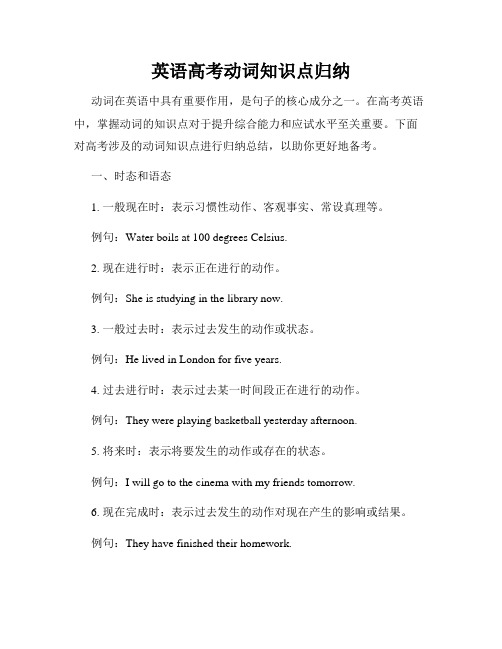
英语高考动词知识点归纳动词在英语中具有重要作用,是句子的核心成分之一。
在高考英语中,掌握动词的知识点对于提升综合能力和应试水平至关重要。
下面对高考涉及的动词知识点进行归纳总结,以助你更好地备考。
一、时态和语态1. 一般现在时:表示习惯性动作、客观事实、常设真理等。
例句:Water boils at 100 degrees Celsius.2. 现在进行时:表示正在进行的动作。
例句:She is studying in the library now.3. 一般过去时:表示过去发生的动作或状态。
例句:He lived in London for five years.4. 过去进行时:表示过去某一时间段正在进行的动作。
例句:They were playing basketball yesterday afternoon.5. 将来时:表示将要发生的动作或存在的状态。
例句:I will go to the cinema with my friends tomorrow.6. 现在完成时:表示过去发生的动作对现在产生的影响或结果。
例句:They have finished their homework.7. 过去完成时:表示过去某一时间点之前已经发生的动作或存在的状态。
例句:I had already eaten dinner when he arrived.8. 被动语态:强调动作的承受者或结果。
例句:The book was written by Mark Twain.二、情态动词1. can/could:表示能力、允许、请求等。
例句:She can swim very well.2. may/might:表示可能性、许可、建议等。
例句:You may borrow my book.3. must:表示必须、推测等。
例句:You must finish your homework before watching TV.4. will/would:表示意愿、打算、愿意等。
高考英语常见系动词分类总结

高考英语常见系动词分类总结1.表感官的系动词:look, sound, taste, smell, feel(这些词用形容词作表语)2.表似乎的系动词seem, appear3.表变化的系动词:become, get, turn, grow, make, come, go, fall, run4.表依旧的系动词:remain, keep, stay, continue, stand, rest, lie, hold5.可带名词作表语的系动词:become, make, look, sound, fall, prove, remain, turn(该词后接的单数名词前多不用冠词。
如:He turned teacher.)6.如果读者对于这个语法现象还是不怎么理解的话,可以以这个名句为例子学学:the man who dies rich dies disgraced.在巨富中死去,是一种耻辱。
其中的rich and disgraced 是说明主语的性质的。
1)状态系动词用来表示主语状态,只有be一词,例如:He is a teacher. 他是一名教师。
(is与补足语一起说明主语的身份。
)2)持续系动词用来表示主语继续或保持一种状况或态度,主要有keep, rest, remain, stay, lie, stand, 例如:He always kept silent at meeting. 他开会时总保持沉默。
This matter rests a mystery. 此事仍是一个谜。
3)表像系动词用来表示"看起来像"这一概念,主要有seem, appear, look, 例如:He looks tired. 他看起来很累。
He seems (to be) very sad. 他看起来很伤心。
4)感官系动词感官系动词主要有feel, smell, sound, taste, 例如:This kind of cloth feels very soft. 这种布手感很软。
高中英语高考动词分类汇总(共四大类)
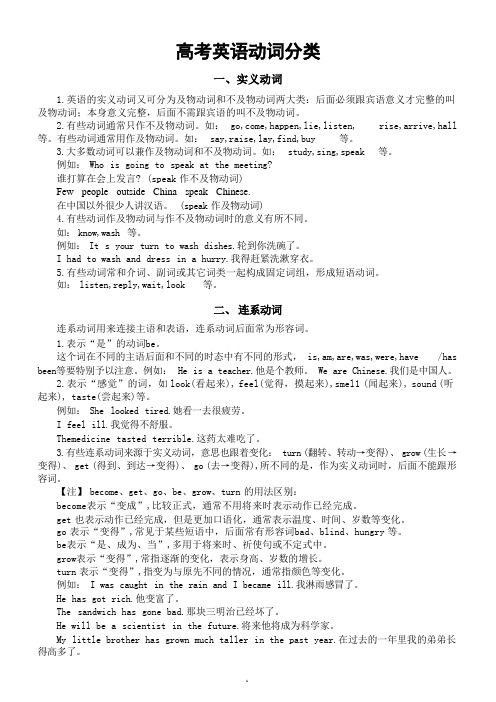
高考英语动词分类一、实义动词1.英语的实义动词又可分为及物动词和不及物动词两大类:后面必须跟宾语意义才完整的叫及物动词;本身意义完整,后面不需跟宾语的叫不及物动词。
2.有些动词通常只作不及物动词。
如: go,come,happen,lie,listen, rise,arrive,hall 等。
有些动词通常用作及物动词。
如:say,raise,lay,find,buy 等。
3.大多数动词可以兼作及物动词和不及物动词。
如:study,sing,speak 等。
例如: Who is going to speak at the meeting?谁打算在会上发言? (speak 作不及物动词)Few people outside China speak Chinese.在中国以外很少人讲汉语。
(speak 作及物动词)4.有些动词作及物动词与作不及物动词时的意义有所不同。
如:know,wash 等。
例如:It s your turn to wash dishes.轮到你洗碗了。
I had to wash and dress in a hurry.我得赶紧洗漱穿衣。
5.有些动词常和介词、副词或其它词类一起构成固定词组,形成短语动词。
如:listen,reply,wait,look 等。
二、连系动词连系动词用来连接主语和表语,连系动词后面常为形容词。
1.表示“是”的动词be。
这个词在不同的主语后面和不同的时态中有不同的形式, is,am,are,was,were,have /has been等要特别予以注意。
例如: He is a teacher.他是个教师。
We are Chinese.我们是中国人。
2.表示“感觉”的词,如look(看起来), feel(觉得,摸起来),smel1 (闻起来), sound (听起来), taste(尝起来)等。
例如: She looked tired.她看一去很疲劳。
I feel ill.我觉得不舒服。
高三英语动词归类复习学生课堂笔记

高三英语动词归类复习学生课堂笔记一、连系动词类①变化类: become get turn grow make come go fall②感官类: look sound feel taste smell③显得类: seem appear look④状态类: keep stay remain lie sit stand (prove turn out)二、使役、感官动词类: see look at watch notice observe let make have/get hear listen to feel提示:吾看三室两厅一感觉三、主动表被动: sell wash burn cook cut drive dress play last open write start run read act draw提示:说明主语的特点、性质、状态四、只接动名词做宾语的词/词组: consider suggest/advise look forward to excuse/pardon admit put off/delay/postpone fancy avoid miss keep/keep on practice deny finish enjoy/appreciate forbid imagine risk can’t help mind allow/permit escape提示:考虑建议盼原谅,承认推迟没得想。
避免错过继续练,否认完成就欣赏。
禁止想象才冒险,不禁介意准逃亡。
①“to”作介词get down to devote… to lead to be/get/become used togo back to object to②带有介词in succeed(in) spend/waste time(in) be busy(in)have a good/hard time(in) have difficulty/trouble(in)③give up dislike feel like insist on can’t stand understand④“值得”be worth=deserve be worthy of being done / be worthy to be done⑤It is no use/good It is of little use/good It is useless五、只接不定式作宾语的词/词组:decide/determine learn want expect/hope/wish refuse manage care pretend offer promise choose plan agree ask/beg help提示:决心学会想希望,拒绝设法愿假装。
高考英语动词知识点总结

高考英语动词知识点总结动词在英语中扮演着重要的角色,是句子的核心成分之一。
在高考英语中,动词的使用和运用能力直接影响着考生的语言表达能力和分数。
因此,对于高考英语动词知识点的总结和掌握显得尤为重要。
本文将从常见动词的分类、时态的使用、动词短语的运用等几个方面进行论述,以帮助高中生更好地备考。
一、常见动词的分类在英语中,动词可以被分为不规则动词和规则动词两类。
不规则动词的变形方式与一般规则不同,需要特别记忆。
常见的不规则动词有be、have、do、go等。
规则动词则按照固定的变形方式进行相应变化,主要包括一般动词、动词原形和动词的过去分词形式。
掌握这些动词的分类和变形规则,能够帮助高中生更加顺利地进行语言表达。
二、时态的使用时态是动词的一种变化形式,表示动作发生的时间。
日常生活中,我们常用到的时态有一般现在时、一般过去时、一般将来时等。
在高考英语中,掌握时态的正确使用是必不可少的。
一般现在时用来表示经常性或习惯性的动作,说明客观真理或科学事实;一般过去时用来表示过去的事件或状态;一般将来时则用来表示将来的时间。
理解并正确使用这些时态,能够提高高中生的写作和阅读能力。
三、动词短语的运用动词短语是由一个或多个词构成的固定搭配形式,往往具有一个整体的意义。
在高考英语中,动词短语的正确使用能够丰富句子的表达,使语言更加地生动。
例如,break down意为“出故障、中断”,come up with意为“提出、想出”,give up意为“放弃”等等。
掌握这些常见的动词短语,有助于提高高中生在英语写作和阅读中的表达能力。
四、动词的语态动词的语态指的是动作的主体和客体之间的关系。
英语中常见的语态有主动语态和被动语态。
主动语态表示主体主动进行或实施动作,而被动语态则表示主体是动作的承受者。
在高考英语中,被动语态常常用于句子中的强调或者当主语不确定时。
例如,“The book was written by him.”这句话就是被动语态,强调了谁写了这本书。
高考英语单词分类总结

listen to sb
sound like sth
hear sb
arrive in/at
get to
reach
belong to sb
own sth
possess sth
lie in +
be situated in +
be located in +
contact with sb
助动词
1
be
形式变化:am/ is/ are/ was/ were/ been/ being
同时是实义和系动词
2
do
形式变化:does/ did
同时是实义动词
3
have
形式变化:has/ had/ having
同时是实义动词
4
shall
形式变化:should
同时是情态动词
5
will
形式变化:would
fail + in
succeed +in doing
fall +off/ onto
struggle + for/ against
vote +for/ against
care + for/about
apologize + to sb for doing
argue + about sth with sb
作及物动词时是"升高;举起"。He lifted his glass and drank.
类似的还有:beat vi.(心脏)跳动/vt.敲、打; grow vi.生长/ vt.种植
play vi.玩耍/ vt.打(牌、球)演奏smell vi.发出(气味)/ vt.嗅
高考英语动词和动词短语知识点分类总结复习(含答案精品)
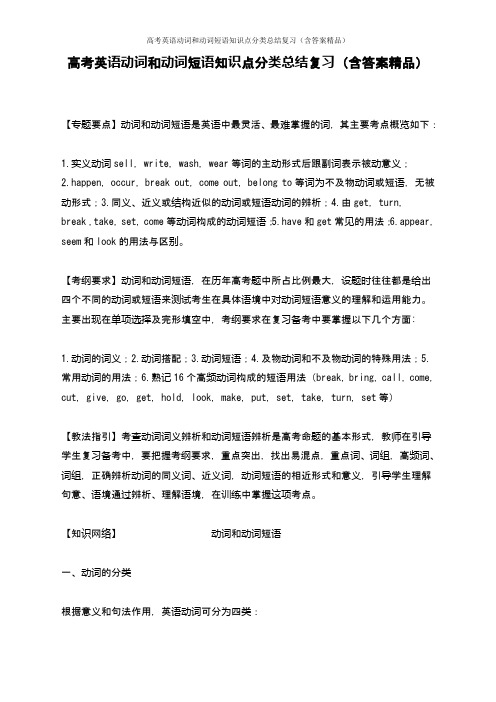
高考英语动词和动词短语知识点分类总结复习(含答案精品)【专题要点】动词和动词短语是英语中最灵活、最难掌握的词,其主要考点概览如下:1.实义动词sell, write, wash, wear等词的主动形式后跟副词表示被动意义;2.happen, occur, break out, come out, belong to等词为不及物动词或短语,无被动形式;3.同义、近义或结构近似的动词或短语动词的辨析;4.由get, turn,break ,take, set, come等动词构成的动词短语;5.have和get常见的用法;6.appear, seem和look的用法与区别。
【考纲要求】动词和动词短语,在历年高考题中所占比例最大,设题时往往都是给出四个不同的动词或短语来测试考生在具体语境中对动词短语意义的理解和运用能力。
主要出现在单项选择及完形填空中,考纲要求在复习备考中要掌握以下几个方面:1.动词的词义;2.动词搭配;3.动词短语;4.及物动词和不及物动词的特殊用法;5.常用动词的用法;6.熟记16个高频动词构成的短语用法(break, bring, call, come, cut, give, go, get, hold, look, make, put, set, take, turn, set等)【教法指引】考查动词词义辨析和动词短语辨析是高考命题的基本形式,教师在引导学生复习备考中,要把握考纲要求,重点突出,找出易混点,重点词、词组,高频词、词组,正确辨析动词的同义词、近义词,动词短语的相近形式和意义,引导学生理解句意、语境通过辨析、理解语境,在训练中掌握这项考点。
【知识网络】动词和动词短语一、动词的分类根据意义和句法作用,英语动词可分为四类:1.行为动词(实义动词)①及物动词(带宾语):study, develop;②不及物动词(不带宾语)work, swim, go, come③状态动词(相对静止)contain, exist, own, prefer, belong④动作动词延续性(work, stay);非延续性(marry, go, come)2.系动词①表示人或事物的特征和状态:be, feel, look, seem, taste, appear, sound②表示状态的变化:turn, go, become, get, fall, grow③表示某种状态的延续或持续:remain, keep, stay3.助动词(与动词原形或分词构成复合谓语):be(am,is,are),do(does,did);have(has);will,would,shall4.情态动词:can(could),may(might),must,shall(should)二、动词及动词短语(一)、动词词义辨析动词是是各类考试的重点,高考试题中,单项填空、完形填空和改错等三项题型中,动词辨义的比重较大,并逐年增加。
高考动词知识点归纳
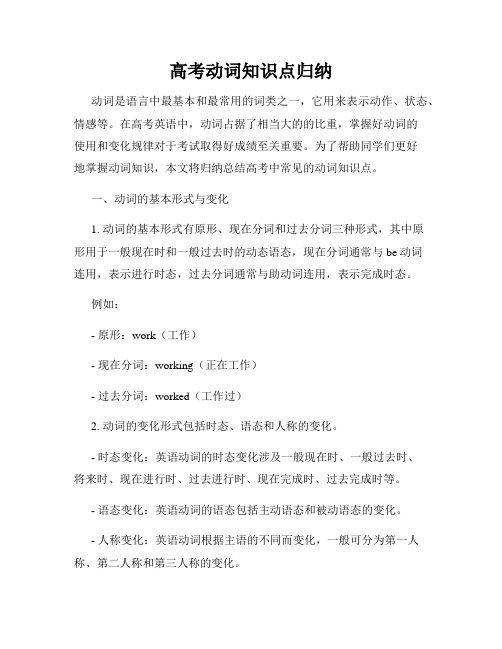
高考动词知识点归纳动词是语言中最基本和最常用的词类之一,它用来表示动作、状态、情感等。
在高考英语中,动词占据了相当大的的比重,掌握好动词的使用和变化规律对于考试取得好成绩至关重要。
为了帮助同学们更好地掌握动词知识,本文将归纳总结高考中常见的动词知识点。
一、动词的基本形式与变化1. 动词的基本形式有原形、现在分词和过去分词三种形式,其中原形用于一般现在时和一般过去时的动态语态,现在分词通常与be动词连用,表示进行时态,过去分词通常与助动词连用,表示完成时态。
例如:- 原形:work(工作)- 现在分词:working(正在工作)- 过去分词:worked(工作过)2. 动词的变化形式包括时态、语态和人称的变化。
- 时态变化:英语动词的时态变化涉及一般现在时、一般过去时、将来时、现在进行时、过去进行时、现在完成时、过去完成时等。
- 语态变化:英语动词的语态包括主动语态和被动语态的变化。
- 人称变化:英语动词根据主语的不同而变化,一般可分为第一人称、第二人称和第三人称的变化。
- 时态变化:I work(我工作),I worked(我工作过),I will work (我将要工作)- 语态变化:I am loved(我被爱),I love(我爱)- 人称变化:I work(我工作),You work(你工作),He/she works(他/她工作)二、动词的时态高考中常见的动词时态包括一般现在时、一般过去时、将来时、现在进行时、过去进行时、现在完成时、过去完成时等。
1. 一般现在时:表示经常性的动作或状态。
例如:- They go to school by bus every day.(他们每天乘公交车去学校。
)- The sun rises in the east.(太阳从东方升起。
)2. 一般过去时:表示过去发生的动作或状态。
例如:- She lived in New York for three years.(她在纽约住了三年。
高考动词总结
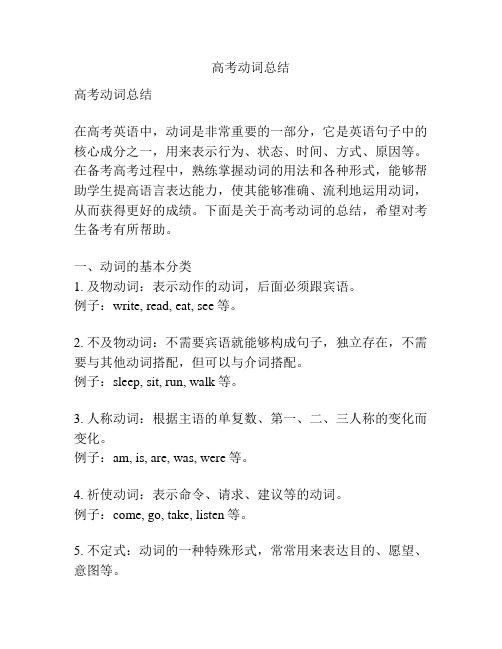
高考动词总结高考动词总结在高考英语中,动词是非常重要的一部分,它是英语句子中的核心成分之一,用来表示行为、状态、时间、方式、原因等。
在备考高考过程中,熟练掌握动词的用法和各种形式,能够帮助学生提高语言表达能力,使其能够准确、流利地运用动词,从而获得更好的成绩。
下面是关于高考动词的总结,希望对考生备考有所帮助。
一、动词的基本分类1. 及物动词:表示动作的动词,后面必须跟宾语。
例子:write, read, eat, see等。
2. 不及物动词:不需要宾语就能够构成句子,独立存在,不需要与其他动词搭配,但可以与介词搭配。
例子:sleep, sit, run, walk等。
3. 人称动词:根据主语的单复数、第一、二、三人称的变化而变化。
例子:am, is, are, was, were等。
4. 祈使动词:表示命令、请求、建议等的动词。
例子:come, go, take, listen等。
5. 不定式:动词的一种特殊形式,常常用来表达目的、愿望、意图等。
例子:to do, to go, to visit等。
二、动词时态的使用1. 现在时态:表示目前正在进行的动作或者一种状态。
例子:I am reading a book.(我正在看书。
)2. 过去时态:表示过去已经发生的动作或状态,强调过去的时间。
例子:He went to the supermarket yesterday.(他昨天去了超市。
)3. 将来时态:表示将要发生的动作或状态,用于表达即将发生的事情。
例子:I will go to Beijing next week.(我下周将去北京。
)4. 完成时态:表示已经发生的动作或状态,常常与时间状语连用。
例子:I have finished my homework.(我已经完成作业了。
)5. 进行时态:表示持续的动作或状态,与时间状语、表示持续时间的状语连用。
例子:They have been playing basketball for two hours.(他们已经打了两个小时的篮球。
英语高考常见动词短语积累归纳总结

英语高考常见动词短语积累归纳总结(一)♣ look 的常用短语:look up … in 查找look sb. up and down 上下打量look back to/ upon 回顾look upon … as 把……看作look forward to 期待look through 浏览; 看穿take a new look 呈现新面貌♣ fear 的常用短语:in fear 害怕地(be) in fear of 害怕for fear of/ that 担心;生怕♣ concentrate 的常用短语:concentrate on 专心……concentrate one's mind on 专心于……类似的短语:fix one's mind uponfocus onput one's heart intofocus one's mind on♣ surprise 常用短语:in surprise 惊讶地to one's surprise 使某人惊讶的是be surprise at/to do/that 对某事感到惊讶♣表示“穿衣”的动作或状态的词和短语1.表示动作的有:pull onput ondressdress sb2. 表示状态的有:wearbe inbe dressed inhave … on♣常见表“喜欢”的短语和单词likecare forbe keen onbe fond oftake delight in …♣ trouble 的常用短语:have much trouble / no trouble (in) doing 在……有/没有困难take great trouble to do不辞辛劳做某事put sb to the trouble of doing …为难某人做某事make trouble捣乱be in (great) trouble惹麻烦;处在困境中help sb. out of trouble帮某人摆脱困境♣ end 的常用短语:come to an end ……结束put an end to 结束……on end 竖起, 连续in the end 终于; 最后end up (by) doing … 以……结束make both ends meet 收支相抵♣表示“导致”、“由……引起”的短语:1. 导致cause sth. (to do)result inlead to2. 由……引起be caused byresult fromgrow out oflie in♣表“全力以赴”的短语:do / try one's bestspare no efforts to dotake great pains to dogo all out to dodo what somebody can (do) to dodo all somebody can (do) to do♣ direction常用短语:in (the ) direction of … 朝……方向under the direction of … 在……的指导下follow the directions照说明去做♣ far 常用短语:far from (being) 离……要求相差很远far from + (a place) 距离某地很远far away 遥远so far 到目前为止; 那么远as far as sb. knows/sees 据某人所知by far (最高级前, 比较级后)起强调作用♣ distance 常用短语:in the distance 在远处from/ at a distance 从远处keep sb. at a distance 于某人保持一定距离It is no distance at all. 不远。
高考英语核心动词全部归类
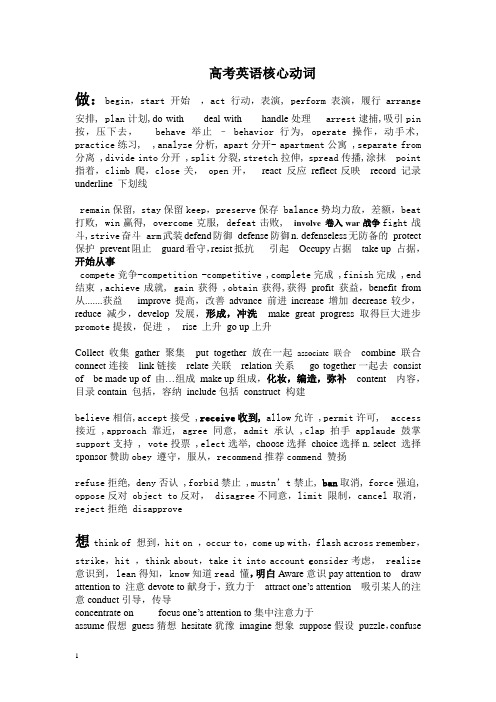
高考英语核心动词做:begin,start开始,act行动,表演, perform表演,履行 arrange安排, plan计划,do with deal with handle处理 arrest逮捕,吸引pin 按,压下去, behave举止– behavior行为, operate操作,动手术, practice练习, ,analyze分析, apart分开- apartment公寓 ,separate from 分离 ,divide into分开 ,split分裂,stretch拉伸, spread传播,涂抹 point 指着,climb 爬,close关, open开,react 反应reflect反映record 记录underline 下划线remain保留, stay保留keep,preserve保存 balance势均力敌,差额,beat 打败, win赢得, overcome克服, defeat击败, involve 卷入war战争fight战斗,strive奋斗 arm武装defend防御defense防御n. defenseless无防备的protect 保护prevent阻止guard看守,resist抵抗引起Occupy占据take up 占据,开始从事compete竞争-competition -competitive ,complete完成 ,finish完成 ,end 结束 ,achieve成就, gain获得 ,obtain获得,获得profit 获益,benefit from 从.......获益improve提高,改善advance 前进increase增加decrease较少,reduce 减少,develop发展,形成,冲洗make great progress取得巨大进步promote提拔,促进 , rise 上升go up上升Collect收集gather聚集put together放在一起associate 联合combine联合connect连接link链接relate关联relation关系go together一起去consist of be made up of 由…组成make up组成,化妆,编造,弥补content 内容,目录contain 包括,容纳include包括construct 构建believe相信,accept接受 ,receive收到,allow允许 ,permit许可, access 接近 ,approach靠近, agree同意, admit承认 ,clap 拍手applaude 鼓掌support支持 , vote投票 ,elect选举, choose选择choice选择n. select 选择sponsor赞助obey 遵守,服从,recommend推荐commend 赞扬refuse拒绝, deny否认 ,forbid禁止 ,mustn’t禁止, ban取消, force强迫, oppose反对 object to反对, disagree不同意,limit 限制,cancel 取消,reject拒绝 disapprove想think of 想到,hit on ,occur to,come up with,flash across remember,strike,hit ,think about,take it into account c onsider考虑, realize 意识到, lean得知, know知道read 懂,明白Aware意识pay attention to draw attention to 注意devote to献身于,致力于attract one’s attention 吸引某人的注意conduct引导,传导concentrate on focus one’s attention to集中注意力于assume假想guess猜想hesitate犹豫imagine想象suppose假设puzzle,confuse使…迷惑consider考虑doubt 怀疑wonder 想知道,wander漫游regard 认为,insure确保certain特定的sure当然,确定convince确信make sure确保secure 使安全confirm确认decide决定,断定determine决定mean to 打算做try to 尽力做attempt to企图做intend to打算做manage to设法做成trust信任believe 相信Indicate指出show 表明infer conclude推断Admire 钦佩,羡慕envy嫉妒respect尊敬-aspect 方面desire 渴望eager 渴望的hope 希望expect期望wish希望show mercy to have mercy on sb 同情influence affect 影响refer to参考,指的是liberate解放感觉.sense 感觉look看起来smell闻起来taste 尝起来sound听起来feel 摸起来touch 触摸,感动生活:shake 摇头nod 点头droop,hang低垂(头)wave 挥手rock摇晃roll滚stamp跺脚smile 微笑,laugh大笑,hate恨,讨厌,kiss吻,please取悦,cry哭tear撕,眼泪,hide藏,掩藏,insert插入,switch切换,watch TV看电视plant 植树,speed 超速travel 旅游,lift举起,电梯,drop 落下,drip 滴落,shut闭dress 穿wear ,try on,have on be in imitate 模仿belong to属于,exit 出去,bar 阻挡,enter 进去,exist 存在live 活,居住,depend 依靠,control 控制,Pull拉push推pump泵水pour倾倒Look out watch out be careful come on take care小心matter,mind,care about,take care of care for look after照顾concerns about 关心care about在意adopt 收养、采纳Sweep扫地tidy弄整洁make the bed整理床铺wipe擦洗clean弄干净clear 清理sleep 睡,wind上发条,缠绕,风breathe 呼吸,cough 咳嗽,wake 醒来,fold折叠,bathe洗澡comb梳,wash洗,brush刷,shave 刮(胡子),sink下沉,水槽,exercise锻炼,bend弯腰,致力于,拐弯,press压,starve饿, drink渴,cut切,mix混合,bake烘烤, steam蒸,fry 炸,boil煮,dissolve溶解,melt融化 eat吃, swallow 吞,咽, digest,消化, feed 喂,tie 栓,系,reserve预定, treat款待,对待,治疗cure治愈, recover恢复健康, serve 服务(及物), order点菜,set放置, place 放置,cheers干杯raise 养活,筹集资金提高,feed喂养bring up 抚养hire雇佣,短租,rent长租save 节省,保存,挽救rescue 营救depend on rely on-依靠依赖divorce离婚marry 结婚engage订婚fade褪色,sew 缝(衣服)iron熨烫,swing 摇晃,wear 穿,戴,面带(表情),mess弄乱bear 生孩子,熊,忍受,负担,结果实name 命名show展示,display陈列fasten弄牢固fix安装修理repair修理mend 修补工作:share分享,共用spare腾出,业余的,备用的,waste 浪费,guide 引导,graduate毕业,shape塑造,形状,fail失败,succeed 成功,welcome 欢迎,make a difference ,count much,matter 很重要,make no difference,count little,it doesn't matter 不重要,treasure珍视,value 珍惜evaluate估价weigh权衡worth 值,deserve 值得,该受,exploit 剥削,利用,make use of 利用,make the most of 充分利用,smooth消除困难,光滑的,set up,found 建立,speed 速度,超速 fine 罚款,occupy employ pursue engage 忙于spell 拼写,Paint 涂颜料,park 停车,edit 编辑design设计describe 描写Adapt 改编,company 公司陪伴,print 打印,contribute 贡献,devote to 致力于,store 储存,add添加multiply乘minus减divide除Work out算出,健身measure测量figure out考虑出figure人物,体型,数字,图画,影子 revise修订master掌握learn 学习grasp紧抓,掌握Attend ,present 参加,出席take part in 参加join加入join in参加organize组织Aid 帮助assist帮助help 帮助assistant助手rank排等级match fit suit score 打分sign标牌,做标记-signal 信号mark 打分,做标记delay put off 推迟cancel call off ,取消cause ,bring about 引起说ask问,question质问,beg乞求 ,tell a lie撒谎 ,(ie lied lied 撒谎,lie lay lain 躺lying lay laid laid 下蛋,放置,laying )boast 吹牛cheat,take in 欺骗 , joke开玩笑 ,trick开玩笑,laugh at嘲笑 , warn 警告 sigh叹息,mourn默哀apply申请 ,interview面试,采访 , announce 宣布 , declare宣布, inform 通知 ,answer回答, reply回复, respond回应 apologize道歉,excuse原谅 ,forgive原谅 pardon宽恕,再说一遍speak说,say说话,tell告诉,区分distinguish 区分compare 比较contrast 对比,comment评论, remark评论, communicate交流,chat聊天,talk谈论 ,greet 问候,打招呼, comfort安慰, pronounce发音, introduce介绍, invite邀请, promise承诺,预示,promising有前途的 praise表扬,pray祈祷 ,foretell预告, predict预测 ,forecast预告, remind提醒 ,shout大声喊叫,cry大喊let out 说出,发出 whisper悄悄话,murmur低声说,嘀咕whistle打口哨,repeat重复,mention 提及encourage鼓励,inspire鼓舞interpret口译, (translate笔译) address演讲,地址deliver递送,发表演讲,stress强调,persuade 说服,voice说出 volunteer 志愿,encourage 鼓励, report报道,appreciate感激,欣赏 cheer 欢呼,干杯, read 读,明白shout 大声喊叫,scream尖叫 ,express表达,(press压impress给。
【备战高考】英语语法动词归纳总结

【备战高考】英语语法动词归纳总结一、单项选择动词1.An energy ministry official says all of the country’s nuclear plants have been________ and are capable of standing natural disasters.A.arranged B.appreciated C.inspected D.performed【答案】C【解析】【详解】考查动词词义辨析。
句意:一名能源部官员表示,该国所有的核电站都经过了检查,能够承受自然灾害。
A. arranged安排;B. appreciated感激;C. inspected检查;D. performed执行,表演。
结合句意故选C。
2.The event that _________ in my memory happened one morning in 1983 when I was 14 years old. It has never escaped.A.stood out B.stands outC.would stand out D.has stood out【答案】B【解析】【详解】考查时态。
句意:在我的记忆中最突出的事件发生在1983年的一个早晨,当时我14岁。
它从未逃出过我的记忆。
此处指目前的一种客观事实,所以要用一般现在时态,故选B。
3.Though Tom was physically challenged, he did not _______ himself to his fate.A.resist B.reserve C.resign D.rescue【答案】C【解析】试题分析:考查动词辨析及固定搭配。
动词resist反对,抵制;忍耐,抵抗;reserve预约;保留;储备;resign辞职;放弃;屈从;勉强接受;rescue救援;动词短语resign oneself to...听从,顺从;句意:尽管Tom生理有缺陷,但他没有顺从命运的安排。
高中英语高考常见动词短语归纳总结
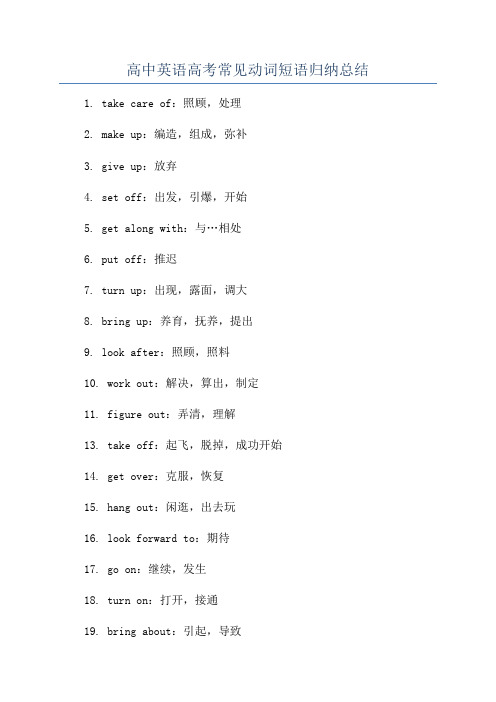
高中英语高考常见动词短语归纳总结
1. take care of:照顾,处理
2. make up:编造,组成,弥补
3. give up:放弃
4. set off:出发,引爆,开始
5. get along with:与…相处
6. put off:推迟
7. turn up:出现,露面,调大
8. bring up:养育,抚养,提出
9. look after:照顾,照料
10. work out:解决,算出,制定
11. figure out:弄清,理解
13. take off:起飞,脱掉,成功开始
14. get over:克服,恢复
15. hang out:闲逛,出去玩
16. look forward to:期待
17. go on:继续,发生
18. turn on:打开,接通
19. bring about:引起,导致
20. pay attention to:注意
21. give back:归还,还回
22. make sure:确保
23. look up:查找,仰望
24. find out:查明,发现
26. break down:故障,崩溃
27. go by:经过,度过
28. set up:建立,设立
29. give in:屈服,让步
30. take out:取出。
高考英语常考动词与动词短语总结
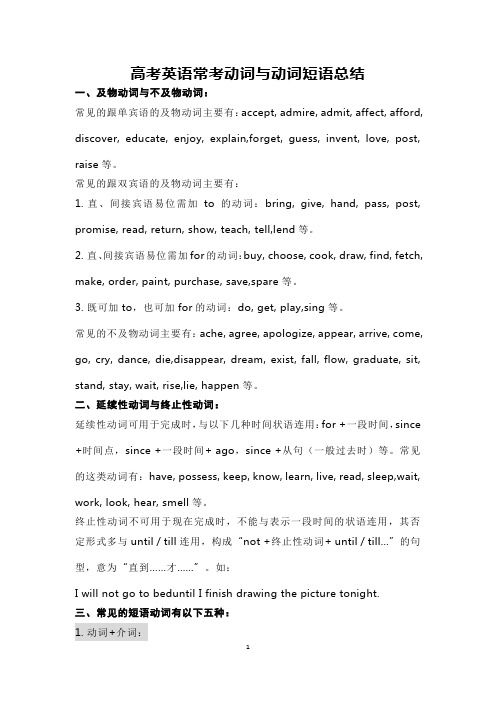
高考英语常考动词与动词短语总结一、及物动词与不及物动词:常见的跟单宾语的及物动词主要有:accept, admire, admit, affect, afford, discover, educate, enjoy, explain,forget, guess, invent, love, post, raise等。
常见的跟双宾语的及物动词主要有:1. 直、间接宾语易位需加to的动词:bring, give, hand, pass, post, promise, read, return, show, teach, tell,lend等。
2. 直、间接宾语易位需加for的动词:buy, choose, cook, draw, find, fetch, make, order, paint, purchase, save,spare等。
3. 既可加to,也可加for的动词:do, get, play,sing等。
常见的不及物动词主要有:ache, agree, apologize, appear, arrive, come, go, cry, dance, die,disappear, dream, exist, fall, flow, graduate, sit, stand, stay, wait, rise,lie, happen等。
二、延续性动词与终止性动词:延续性动词可用于完成时,与以下几种时间状语连用:for +一段时间,since +时间点,since +一段时间+ ago,since +从句(一般过去时)等。
常见的这类动词有:have, possess, keep, know, learn, live, read, sleep,wait, work, look, hear, smell等。
终止性动词不可用于现在完成时,不能与表示一段时间的状语连用,其否定形式多与until / till连用,构成“not +终止性动词+ until / till...”的句型,意为“直到……才……”。
高三英语高考语法知识点归纳总结动词的时态和语态
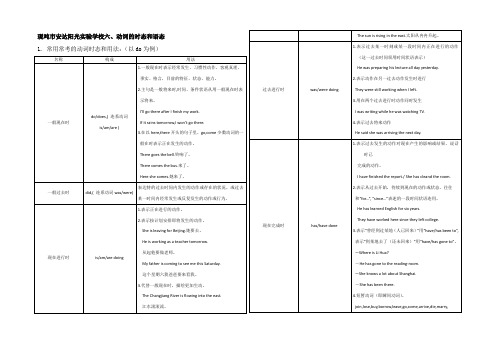
I read the novel last month. (只说明上个月看了,不涉及现在是否记住)
现在完成时与现在完成进行时的比较
着重表示动作的结果时,用现在完成时
I have read that book.我读过那本书了。(知道那本书的内容)
着重表示动作一直在进行,即动作的延续性时,则用现在完成进行时
(只说明他过去当过木匠不涉及到现在)
一般过去时只表达过去的动作或状态
Hello, I ____ you were in London. How long _________ here?
A. don’t know; were you B. hadn’t known; are you
C. haven’t known; areD. didn’t know; have you been
—Hi, Tracy, you look tired.
—I am tired. I _______ the living room all day.
A. paintedB. had painted
C. have been paintingD. have painted
说明:强调动作从过去到现在的延续
— Oh, I’m terribly sorry. _______.
A. I’m not noticing.B. I wasn’t noticing.
C. I haven’t noticed.D. I don’t notice.
说明:对话的后者显然是在解释刚才不小心冒犯对方时正在做的事情.
一般过去时与过去进行时的比较
Here she comes.她来了。
一般过去时
高考动词知识点归纳总结

高考动词知识点归纳总结动词作为语言中最基本的词类之一,承担着表达动作、状态、感情等含义的重要角色。
对于高考英语考试来说,掌握动词的相关知识点是非常关键的。
本文将对高考动词知识点进行归纳总结,以便考生更好地备考。
一、动词的时态1. 一般现在时表示经常性的动作或客观事实。
例如:"I play basketball every Sunday."2. 一般过去时表示过去某个时间发生的动作或状态。
例如:"He watched a movie last night."3. 现在进行时表示现阶段正在进行或发生的动作。
例如:"She is reading a book now."4. 过去进行时表示过去某个时间正在进行或发生的动作。
例如:"They were playing soccer yesterday."5. 现在完成时表示过去发生的动作对现在造成的影响或结果。
例如:"I have finished my homework."6. 过去完成时表示过去某个时间之前已经发生的动作。
例如:"She had already left before I arrived."7. 将来时表示将来某个时间还没有发生的动作。
例如:"They will go on a trip next month."二、动词的语态1. 主动语态表示主语主动进行或执行的动作。
例如:"He washed the car."2. 被动语态表示主语是动作的承受者或受害者。
例如:"The car was washed by him."三、动词的情态动词1. can/could表示能力、许可、请求等。
例如:"I can swim."2. may/might表示可能性、许可、建议等。
高考英语动词的知识点总结
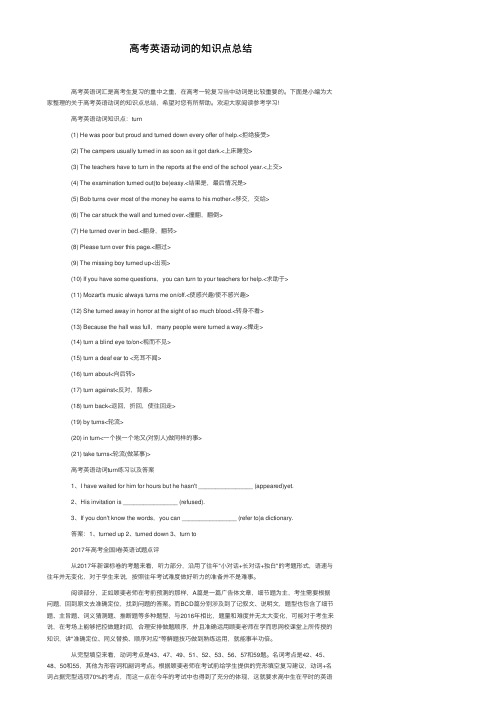
⾼考英语动词的知识点总结 ⾼考英语词汇是⾼考⽣复习的重中之重,在⾼考⼀轮复习当中动词是⽐较重要的。
下⾯是⼩编为⼤家整理的关于⾼考英语动词的知识点总结,希望对您有所帮助。
欢迎⼤家阅读参考学习! ⾼考英语动词知识点:turn (1) He was poor but proud and turned down every offer of help.<拒绝接受> (2) The campers usually turned in as soon as it got dark.<上床睡觉> (3) The teachers have to turn in the reports at the end of the school year.<上交> (4) The examination turned out(to be)easy.<结果是,最后情况是> (5) Bob turns over most of the money he earns to his mother.<移交,交给> (6) The car struck the wall and turned over.<撞翻,翻倒> (7) He turned over in bed.<翻⾝,翻转> (8) Please turn over this page.<翻过> (9) The missing boy turned up<出现> (10) If you have some questions,you can turn to your teachers for help.<求助于> (11) Mozart's music always turns me on/off.<使感兴趣/使不感兴趣> (12) She turned away in horror at the sight of so much blood.<转⾝不看> (13) Because the hall was full,many people were turned a way.<撵⾛> (14) turn a blind eye to/on<视⽽不见> (15) turn a deaf ear to <充⽿不闻> (16) turn about<向后转> (17) turn against<反对,背叛> (18) turn back<返回,折回,使往回⾛> (19) by turns<轮流> (20) in turn<⼀个挨⼀个地⼜(对别⼈)做同样的事> (21) take turns<轮流(做某事)> ⾼考英语动词turn练习以及答案 1、I have waited for him for hours but he hasn't ________________ (appeared)yet. 2、His invitation is ________________ (refused). 3、If you don't know the words,you can ________________ (refer to)a dictionary. 答案:1、turned up 2、turned down 3、turn to 2017年⾼考全国I卷英语试题点评 从2017年新课标卷的考题来看,听⼒部分,沿⽤了往年"⼩对话+长对话+独⽩"的考题形式,语速与往年并⽆变化,对于学⽣来说,按照往年考试难度做好听⼒的准备并不是难事。
- 1、下载文档前请自行甄别文档内容的完整性,平台不提供额外的编辑、内容补充、找答案等附加服务。
- 2、"仅部分预览"的文档,不可在线预览部分如存在完整性等问题,可反馈申请退款(可完整预览的文档不适用该条件!)。
- 3、如文档侵犯您的权益,请联系客服反馈,我们会尽快为您处理(人工客服工作时间:9:00-18:30)。
高考英语动词归类复习一、连系动词二、使役、感观动词三、主动表被动四、只接动名词做宾语的词、词组五、只接不定式作宾语的词、词组六、宾语不同、意义不同七、接动名词、不定式意义区别不大八、宾语不同、语态不同、但意义相同九、接宾语和宾补、形式不同十、接虚拟语气的词十一、瞬间非延续性动词十二、表计划未能实现的动词十三、情感动词类十四、否定前移类十五、不带不定式作复合宾语十六、省略替代类一、连系动词类①变化类:become, get, turn, grow, make, come, go, fall ,go bad / hungry / mad / wrong,fall (fell-fallen) ill / asleep※feel (felt-felt) sick / sleepy②感观类:look, sound, feel, taste, smellHis voice sounds ________.A. wellB. beautifullyC. excellentD. wonderfully③显得类:seem, appear, look It looks as if…It seems as if / that…It appears that…④状态类:keep, stay, remain, lie, sit, stand ★prove, turn out The weather will _____ hot for another two weeks.A. lastB. remainC. getD. turnThe hot weather will ____another two days.A. lastB. remainC. getD. turnThe weather turned out (to be)fine. He proved (to be) honest / an honest person.注:be, become, turn, remain 可带名词He remains a teacher.=He is still a teacher.He became _____ teacher. A. a B. the C. an D. / He turned _______ teacher. A. a B. the C. an D. / 二、使役、感观动词类:let, make, have,see, look at, watch, notice, observe, hear listen to, feelThe boss made them _____12 hours a day.A. workB. to workC. workedD. workingThey were made_______12 hours a day.A. workB. to workC. workedD. workingThe boy was last seen _______football on the playground.A. playB. playingC. to playD. playedHe often heard this song _______by the famous singer.A. singB. singingC. to singD. sungHe had his leg_______.A. breakB. breakingC. to breakD. broken三、主动表被动类:( well, poorly, easily)sell, wash, burn, cook, cut, drive, dress, play, last, open, write, start, translate, run, read, operate, break, measure, weighDry wood burns easily. The cloth washes well. This phrase does not translate well into Chinese.The man always dresses well / poorly. Your composition reads well except for a few spelling mistakes.----Have you got a ticket for the concert? ----No, the tickets____well and they _____out last week.A. sell; were soldB. sell; soldC. sell; have been sold D .are sell; soldDon’t get that ink on your white shirt, for it___.A. won’t wash outB. doesn’t wash awayC. isn’t washing outD. hasn’t washed awayThey tried to get the car ____, but it won’t____.A. started; startB. to start; startC. started; startedD. to start; to start四、只接动名词做宾语的词/词组mind, risk, avoid, enjoy, miss, keep, suggest, appreciate, practise, delay, finish, dislike, excuse, imagine, consider, forbid, escape,admit, advise, allow, put off, give up, be worth, be busy,get down to, devote…to, look forward to, be used to, lead to, succeed in, spend/waste time (in),have a good/hard time (in) , have difficulty /trouble (in) ,there is no use(in)She looked forward every spring to___ the flower-lined garden.A. visitB. paying a visitC. walk inD. walking inI would appreciate ______back this afternoon.A. you to callB. you callC. your callingD. you’re callingThe day he has looked forward to______ at last.A. comingB. cameC. comeD. comes五、只接不定式作宾语的词/词组decide, expect, hope, wish, order, refuse, promise, pretend, agree, seem, attempt, fail, offer, happen, warn, afford,make up one’s mind to, be determined to,used to, be about to, be able to, have to , would like/ love to=should like/love toI would love ______to the party last night but I had to work extra hours to finish a report.A. to goB. to have goneC. goingD. having goneMr Smith warned her son ______after drinking.A. never to driveB. to never driveC. never drivingD. never drive She pretended _______me when I passed by.A. not to seeB. not seeingC. to not seeD. having not seen六、宾语不同、意义不同n 1) go on to do / go on doingn 2) stop to do / stop doingn 3) remember to do / remember doingn 4) forget to do / forget doingn 5) mean to do / mean doingn 6) regret to do / regret doingn 7) try to do / try doingn 8) can’t help (to) do / can’t help doingn ★can’t help but do=can’t but do =have to doI can’t help but tell him the truth.---I usually go there by train. ---Why not ______by boat for a change?A. to try goingB. trying to goC. to try and goD. try going---The light in the office is still on. ---Oh, I forgot___.A. turning it offB. turn it offC. to turn it offD. having turned it off He didn’t remember ______him before.A. having metB. have metC. to meetD. to having metGo on ______the other exercise after you have finished this one. A. to do B. doing C. to be doing D .to be done---You were brave enough to raise objections at the meeting.---Well, now I regret _______that.A. to doB. to be doingC. to have doneD. having done七、接动名词、不定式意义区别不大begin , start, continue, like, love, hate,prefer,It began raining. It is beginning to rain.I prefer staying home to going out. I prefer to stay home rather than go out.Tired as he was, he continued to work. =Though he was very tired, he continued working.He likes playing football, but he doesn’t like to play football today.八、宾语不同、语态不同、但意义相同need, require, want, deserve The room requires to be cleaned. =The room requires cleaning. This sentence needs_________.A. an improvementB. improveC. improvingD. improvedThe baby needs________.A. looked afterB. looking afterC. look afterD. to look after九、接宾语和宾补、形式不同allow, permit, forbid, advise, admit considerWe forbid smoking here. We forbid anybody to smoke here. You are forbidden to smoke here.We are considering _______ to the south.A. goB. to goC. goingD. goneCharles Babbage is generally considered ___the first computer.A.to have inventedB.inventingC.to inventD.having invented十、接虚拟语气的词1)insist 2)order, command 3)advise, suggest, propose , recommend 4)demand, ask, require, requestHe ordered that we (should)leave at once. His order that we (should) leave at once was right.The order was that we (should) leave at once. That we (should) leave at once was his order.He insisted that his brother_____ there.A. goB. wentC. goingD. to goHe insisted that he____ nothing wrong and ____ set free.A. do; beB. had done; wasC. had done; beD. did; wasHis voice suggested that he ______angry.A. isB. beC. wasD. wereHe suggested that the boy _____ sent to hospital at once.A. wasB. beC. isD. were十一、瞬间非延续性动词go, come, leave, start, return, arrive, stop, finish, borrow, lend, open, close, die, become, break, join, kill, marry, graduate, buy,marry--be married seat--be seated hide--behidden engage--be engaged die--be dead begin--beon join--be in borrow--keep come--be/stay leave--be away buy--have=have gotHe died ten years ago, that’s to say, he has __ for ten years.A. been diedB. been deadC. diedD. been dyingWhen Jack arrived he learned Mary ___for almost an hour.A. had goneB. had set off C .had left D. had been awayHe is leaving for Beijing tomorrow. The boy is so sick that he is dying fast. The bus is coming.The train is leaving. I am going.十二、表计划未能实现的动词intend, mean ,hope, plan, expect, think, want, suppose, promiseI had hoped to come here, but I had an unexpected visitor.=I hoped to have come here,…….★Would /should +love / like to have doneHe wants to meet you at the airport. He wanted to have met you at the airport, but he didn’t get there in time.We planned to have done good deeds for the poor people last month. I should (would) like (love) to give her the gift.I should(would) like (love) to have given her the gift. He would like to have played the violin at the concert.十三、情感动词类n 表示人的内在感受的动词encourage, excite, inspire, interest, amaze, satisfy, delight, please, move, frighten, surprise, astonish, shock, disappoint, discourage, puzzle, worry, tire, touch, relaxThe news sounds _____________.(encourage)The play was so ___________ that nearly everybody was _________ to tears.(move)Looking at her paper, she nodded with a___________ smile on her face.(satisfy)He looked at me with a __________ look. (puzzle)十四、否定前移类believe, imagine, suppose, think, feel , guessI don’t think he can finish the work,____?A. can’t heB. can heC. do ID. don’t IWe don’t believe she knows it,______?A. does sheB. doesn’t sheC. do weD. don’t weYou don’t think he can finish it, ______?A. do youB. don’t youC. can heD. can’t he十五、不带不定式作复合宾语hope, agree, suggest, demand, imagine, would ratherI wish him to come.=I hope that he will come.I allowed/permitted him to go there.=I agreed that he can go there. He advised me to do it right now.=He suggested (to me) that I (should) do it right now.I prefer him to go there.=I would rather he went there.I can’t imagine such a girl like Mary doing such a thing.He wanted me to do it.=He demanded that I (should)do it.十六、省略替代类1)believe, think, suppose, expect, guessI think so. I think not = I don’t think so2) hope, fear, be afraid + so / not3) intend, want, plan, wish, like, love, hate, hope, try, would (should) like / love toDo you want to have a rest? Yes, I want to, but I can’t.Did you get the new stamps? No,I tried to, but there wasn’t any left in that post office.I didn’t mean to call you at late night,but I had to as I did have something important to tell you.。
